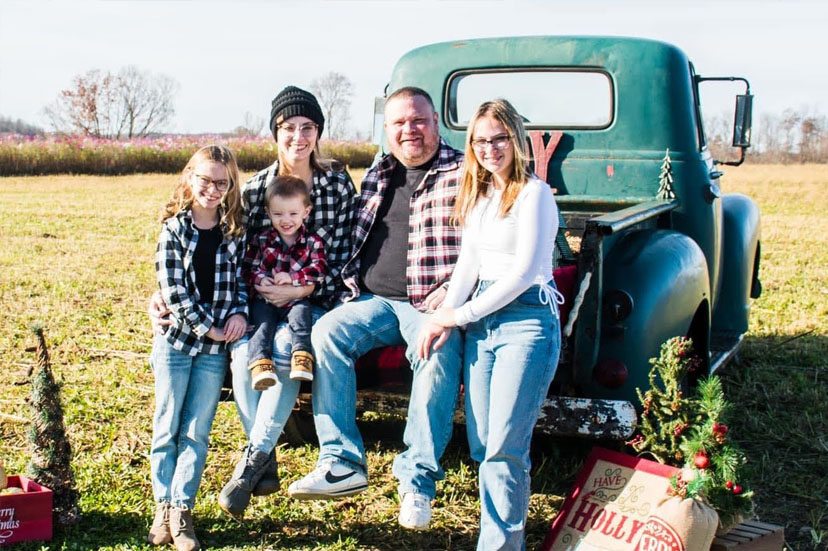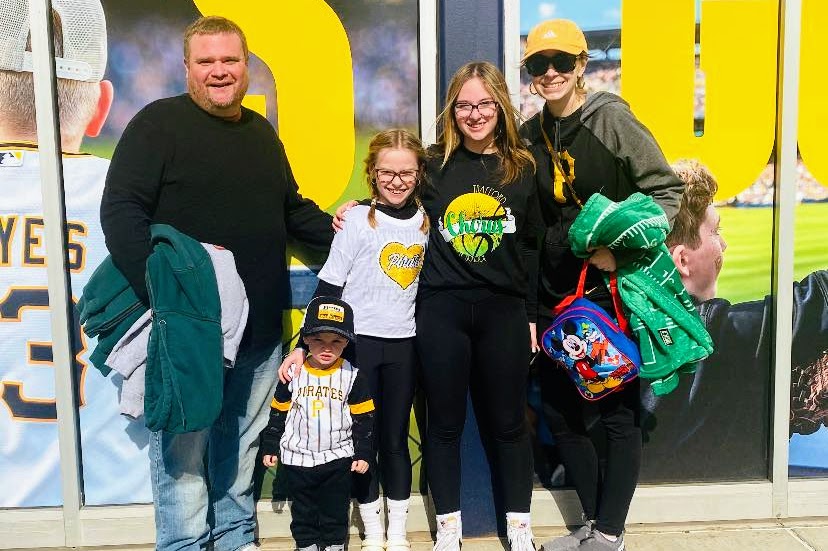

JILLIAN DONIS: PANCREATIC CANCER STORY
Written By: Julia Brabant
May 2023
Date of Diagnosis: May 1, 2022
Current Status: Continuing Treatment
Deemed “inoperable” by multiple doctors, Jillian Donis had the Whipple procedure at 39
Pancreatic cancer is most common among adults over 60, but the number of newly diagnosed patients younger than that is rising. Jillian Donis found out she had “inoperable” pancreatic cancer as a 39-year-old mother of three, but after seeking first, second and third medical opinions, she learned she had more than just options – she had hope.
Jillian noticed her skin and eyes yellowing in May 2022, indicating jaundice. She went to the local emergency room, where doctors conducted a CT scan. Doctors told her they’d identified a mass on her pancreas, but that they weren’t sure what it was and would need to run more tests.
A biopsy revealed that Jillian had pancreatic adenocarcinoma, which is the most common type of pancreatic cancer. After giving that some time to sink in, she interviewed at two major cancer centers, both of which proposed similar treatment plans. She picked the one where she felt more comfortable and began taking FOLFIRINOX, a form of chemotherapy. While doctors didn’t think she was a candidate for surgery, they hoped the medicine would help control the tumor’s growth.
Jillian tolerated eight chemotherapy sessions relatively well, but by the ninth, she started experiencing side effects. Her throat swelled, which doctors attributed to the Oxaliplatin in the FOLFIRINOX drug combination. Rather than completely take her off of the drug, they chose to have her undergo desensitization, which involves administering a very low dose of medication at first and then increasing the dosage over time.
For these reasons, Jillian’s doctors decided to drop the Oxaliplatin from her regimen entirely. She then had two more rounds of chemotherapy using the two remaining drugs and followed it up with 15 sessions of radiation using a linear accelerator, or LINAC.
LINAC is a device that delivers radiation in a manner that reaches a patient’s tumor cells without delivering unnecessary radiation to the areas surrounding the tumor. While undergoing radiation, Jillian saw a renowned local surgical oncologist to see if the doctor might have a different opinion about her surgical chances. That doctor said that, while Jillian’s treatments had helped contain the cancer and decrease her tumor’s size to some degree, she was still unlikely to ever be a candidate for surgery because of the tumor’s artery and vein involvement. The tumor board at the facility agreed with the oncologist’s assertion.
“I refused to take ‘no’ for an answer,” Jillian said. “But after hearing ‘no’ yet again, I left there feeling really defeated.”
She submitted her records to the doctor with the hope that he’d review her case. Dr. Evans did so, and while he couldn’t speak on her surgical chances just yet, he agreed to see her.
Jillian and her husband, Jordan, traveled to Wisconsin from their home in Pennsylvania to see Dr. Evans in January 2023. Jillian’s mother, Diana, also joined them.
After giving Jillian about a month to build up strength, Dr. Evans scheduled surgery for Feb. 27, 2023.
Ultimately, Dr. Evans was able to perform a Whipple, with the intensive surgery taking about 10 hours. After recovering in the hospital, Jillian remained in Wisconsin for a few additional weeks of recovery at Kathy’s House, a hospital guest house for patients who travel to the Milwaukee area to receive care at local hospitals.
Now back home in Pennsylvania, Jillian continues to have maintenance chemotherapy, which aims to help prevent cancer from coming back. She also continues to seek answers about what may have caused her cancer but accepts that she may never get them.
Jillian didn’t have much of a family history of cancer. When she had genetic tests done to see if her children might face heightened cancer risks, the tests did show three common gene mutations associated with pancreatic cancer. However, there weren’t any additional treatment options associated with any of the specific mutations she had.
While Jillian may not have solid answers about what led to her cancer diagnosis at such a young age (Jillian said Dr. Evans estimated that, of every 400 or so new patients treated per year at Froedtert, only about one is under 40), she does have plenty to keep her busy. She’s raising three children ages 2, 9 and 12, and while parenting with pancreatic cancer has its challenges, she sees it as a welcome distraction, too.
Because pancreatic cancer diagnoses often come later in life, many patients don’t have to juggle treatment and parenting at the same time. For this reason, Jillian found it especially helpful to connect with other women who’ve had to manage both. She expressed gratitude for Elise Roth Tedeschi, an 11-year pancreatic cancer survivor and mother she spoke with after reading her story online. She also connected with Camille Moses, another 11-year survivor and advocate for pancreatic cancer research, finding that seeing and speaking to other long-term survivors was important for her psyche.
“It really does help to talk to people on the other side of it,” Jillian said. “You get that sense that, ‘If other people can do it, so can I.’”
Jillian was also hesitant initially about sharing her diagnosis on her personal Facebook page, but found that doing so led to a ton of support. Now, with the support of her family, survivors and even complete strangers, she continues to adjust to life, post-Whipple– and she also tries to get the word out about just how important it is to get more than one medical opinion.
Jillian continues to undergo maintenance chemo as of May 2023.

I had a Whipple procedure December 2, 2020. I am cancer free. I have to take Creon the rest of my life and it caused type 3C diabetes but I am alive. Praying for your recovery. If you need someone to talk to email me.